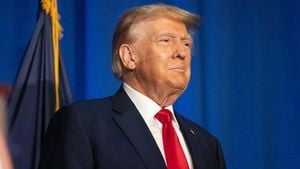Chief Justice of India (CJI) DY Chandrachud found himself at the center of intense discussions recently after Prime Minister Narendra Modi's visit to his residence during the Ganesh Chaturthi celebrations. This meeting ignited a flurry of opinions, particularly from opposition leaders and legal experts, who expressed concerns about the autonomy of India’s judiciary. Chandrachud, whose tenure at the helm of the Supreme Court is set to conclude on November 10, has been vocal about the necessity of sustaining positive interactions between the judiciary and the executive arms of the government.
During an event hosted by The Indian Express, CJI Chandrachud dismissed apprehensions surrounding his encounter with the Prime Minister, arguing, "There is absolutely nothing wrong as these are continuing meetings between the judiciary and the executive even at the social level." He pointed out how customary dialogues occur during various ceremonial events and settings such as at the Rashtrapati Bhavan on Republic Day, emphasizing the social nature of such interactions.
The Chief Justice clarified, "The separation of powers concept does not postulate the judiciary and executive as adversaries. It encourages constructive dialogue addressing fundamental issues like budgeting, infrastructure, and technology." He stressed the importance of maintaining effective communication between the institutions, as these discussions often relate to significant aspects of governance but do not intersect with judicial decision-making.
Yet, the visit raised eyebrows among some circles. Critics suggested it could undermine perceptions of judicial impartiality, which is fundamental to maintaining public trust. Notably, the Bharatiya Janata Party (BJP) defended the PM's visit as reflective of the nation’s cultural values, reinforcing the idea of unity over division between branches of government.
Chandrachud's remarks come at a time when the judiciary faces palpable pressures—constant scrutiny not just from governmental entities but also from societal expectations, often amplified by social media dynamics. He emphasized, "Judicial independence doesn’t mean judges are expected to constantly rule against the government." This assertion reflects the nuanced challenges facing the court system today, where public perception can significantly influence judicial processes.
Drawing on the realities shaped by social media, the CJI recounted instances where pressure groups express dissatisfaction if outcomes don’t align with their interests. He remarked, "If you decide in my favor, you are independent. If you don’t, you are not independent." Such sentiments highlight the perils of conflated notions of judicial independence with popular approval, urging judges to remain steadfastly committed to constitutional values rather than succumbing to external pressures.
At the event, he elaborated how traditional views framed judicial independence primarily as distancing from the government. He noted, “Our society has changed,” thereby necessitating broader understandings of judicial autonomy. The emergence of pressure groups, he suggested, demands vigilance to preserve the courts as impartial arbiters of justice, free from external constraints.
Highlighting his landmark decisions, CJI Chandrachud pointed to instances when opinions about judicial independence fluctuated based on the favorability of outcomes. For example, he recounted the approval he received for his judgment on electoral bonds, which opposed government interests, contrasting it with subsequent criticism when he ruled favorably for the government. His commentary implied the precarious balance judges must maintain between ensuring legal integrity and existing public sentiment.
“You must give judges the freedom to decide based on their conscience, which is — of course — guided by the law and the Constitution,” he stressed. For him, it’s imperative for judges not to be seen merely as political figures or oppositional voices but to forge verdicts grounded on justice principles.
The outgoing Chief Justice reaffirmed his belief in the necessity of establishing stability within the judiciary. He stated, "Incremental changes within the court system are important to maintain jurisprudential stability," guarding against radical shifts triggered by political or social trends. The remarks echoed sentiments shared widely among legal experts, who argue for consistent, gradual reform rather than abrupt changes, which could jeopardize judicial effectiveness.
Chandrachud illuminated his perspective on public inquiries about their influence on court operations, particularly relating the decision-making process to significant national events, such as the impending Lok Sabha elections. He noted how speculation could affect perceptions of judicial impartiality but emphasized the integrity of the judicial process is impervious to such atmospherics. “We decided the electoral bonds case even before the June verdict,” he stated, reinforcing the notion of unyielding foundational principles governing court rulings.
His advocacy for judicial resilience echoed throughout his tenure, potent as ever as he prepares to step aside from the top judicial position. The CJI's future endeavors might carry forward the narrative he espoused during his term—a commitment to uphold judicial independence, defined not merely as opposition to governmental authority, but encompassing the intricacies of societal and institutional interactions.
Chandrachud’s commitment to preserving judiciary autonomy against mounting societal pressures emphasizes his desire for lasting integrity within India’s judicial framework, as he looks to the future with hopes for continued dialogue and collaboration among all branches of governance.



